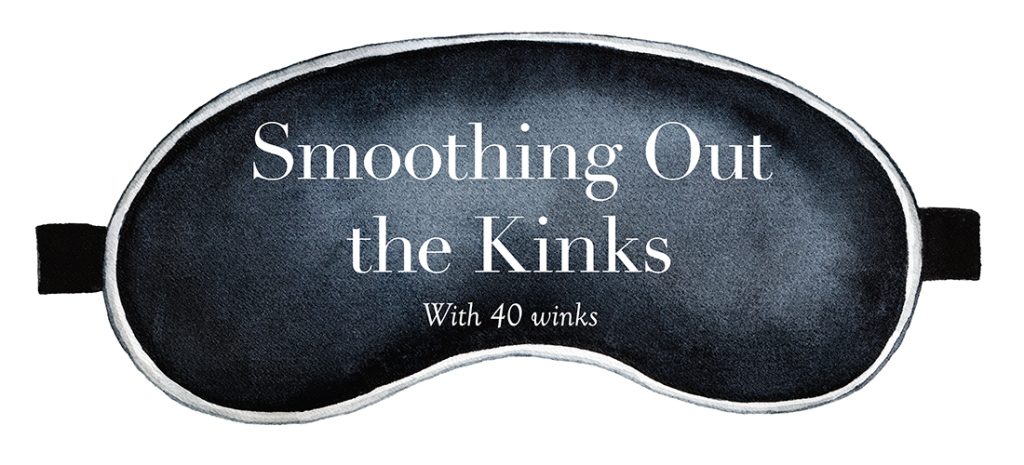Out of the Blue

Smoothing Out the Kinks
With 40 winks
By Deborah Salomon
Everybody understands what “Stop and smell the roses” means. That’s easy.
What about “Stop and take a nap”?
Naps aren’t a sure cure for fatigue, like peanut butter and jelly are for hunger. Neither is sleep a bodily function activated by command. Sometimes it comes as soon as head hits pillow. Other times, the brain dredges up worries . . . like having trouble falling asleep.
I love naps, perhaps because of a 25-year deprivation. A quick nap wasn’t worth removing contact lenses. After my eyes finally rejected the invasion I had surgery that restored vision except for reading, when I wore glasses. What a joy to hit the couch for 15 minutes of shut-eye. No more panic if I drifted off during a Blue Bloods rerun.
Naps are especially important given my sleep patterns in place since high school: rising (way) before dawn to bake, care for pets, fold laundry, exercise and write. I once had neighbors call the police because they heard noises coming from my apartment at 4:30 a.m.
Burglars, they discovered, don’t empty the dishwasher.
But sleep, even short-term, can be tricky, as Hamlet warned . . . “perchance to dream, aye, there’s the rub.”
No scientist, not even Freud, has successfully codified the origin of dreams. Maybe Scrooge was correct when he attributed Yuletide nightmares to “a crumb of cheese.” Lately, I have noticed a shift. My dreams have taken on minute details of weather, clothing, dialogue as in paintings displaying count-the-hairs realism. People I haven’t seen in ages appear and reappear — soap opera dreams, I call them, most with upsetting plot lines that may cover years during a quick nap. Others create a need, like to cook what I’ve dreamt about. That’s me, stirring up arepas at midnight. I’ve never been to South America, where these cornflour pancakes are staples, but I’ve read about them and, conveniently, had the ingredients on hand.
Then, after a long-ago surgery, I learned from medical staff that Demerol, a pain medication, invites jungle animals into the unconscious. Sure enough, here come the lions and tigers.
These deterrents don’t keep me from a 15-30 minute nap most early afternoons, a practice left over from having three kids under 4, who needed a snooze almost as badly as Mom.
As luck would have it, I can sleep through the bumpiest flight, especially if we steerage passengers are allowed blankets on cold, dark mornings. But please give me an elbow when I doze off in a waiting room.
Naps are part of certain cultures, notably Spanish, where a siesta — entirely different from a quick “power” nap — following the midday meal, usually heavy, has been credited for a 37 percent reduction in coronary mortality due to reduced cardiovascular stress. Closer to home, some woke businesses provide partitioned nap rooms with recliners and headphone/alarm clocks for their employees, resulting in a happier, more productive workforce.
But NASA offers the most convincing stats. Their study concludes that a 40-minute nap improved astronauts’ alertness by 100 percent, performance by 34 percent.
Unfortunately, sleep can be addictive, withdrawal unpleasant. Life interferes. Having a cat helps, since naps are a hard-wired behavior they gladly share.
I’m painfully aware that some mental health professionals view sleep as an escape. Maybe so, in excess. But what’s wrong with a little non-drug, non-alcohol induced escape?
While you ponder that, I’m going to turn the phone off, plump the couch pillow, pull up the fuzzy throw, summon my kitty and speak only in ZZZZZs. PS
Deborah Salomon is a contributing writer for PineStraw and The Pilot. She can be reached at debsalomon@nc.rr.com.
